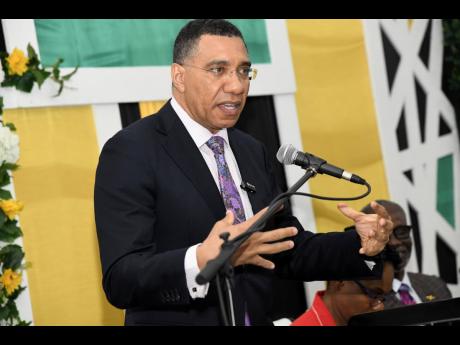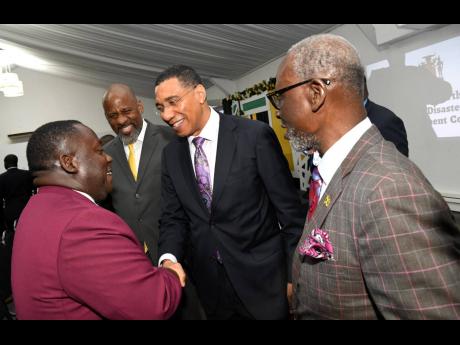Holness: Financial buffers a must in prepping for natural disasters
With another Atlantic hurricane season beginning this past week, on June 1, Prime Minister Andrew Holness has stressed the need for financial buffers in the National Budget, which are to be utilised in the event the island is impacted by a natural disaster.
While speaking at a National Disaster Risk Management Council Meeting, held last Thursday at the Spanish Court Hotel in New Kingston, Holness explained that it was a buffer that he and his government used to cushion the costs on the nation between 2020 and 2022 during the coronavirus (COVID-19) pandemic.
“We have recovered strongly [from the pandemic], without question ... Our response to the COVID-19 pandemic was very quick, very effective and we were able to recover very quickly and much stronger than we were before, because we had buffers. We had financial buffers. We actually took out of the budget and made provisions for the establishment of a fund, so we did not have to borrow. For the average Jamaican, this is like, ‘So, what?’ but this was such a fundamental change in how the Jamaican economy responded. If we were hit by the COVID pandemic in the ‘90s or the early 2000s, what would have been our situation?,” Holness said.
“I’m saying this because it is important that the country appreciates the positive change that is happening right before your very eyes and you may not see it in that context, but Jamaica today, is a much stronger Jamaica than it was a decade ago,” he said.
The prime minister reminded the members of the Disaster Risk Management Council, during the meeting, that careful planning must be put in place to coordinate the use of resources, both human and physical, for saving and sustaining life, as well as protecting property and infrastructure.
Effective legislation
“Jamaica, like many Caribbean countries, we are extremely vulnerable to natural disasters and the human and economic costs are substantial ... Adequate procedures to deal with disaster situations and relief measures must be planned well in advance of the actual disaster event, starting with, of course, strong and effective legislation,” Holness said.
He also said that, although Jamaica can be proud of having “a very well-structured legislative framework to manage disasters”, more legislation is necessary.
“In our framework, legislatively, and in terms of our organisational posture, it is that we expect that there will be a disaster. We expect it! We don’t know when it’s going to happen, but we have put in place various systems to help us to monitor, to track data and to predict ... And the legislation is necessary to ensure that the various leaders of the disaster response are clear on their roles and responsibilities and their duties in law. What you wouldn’t want to happen in a disaster, is for someone to be saying, ‘This is not my role’. That would be the start of another disaster,” he said.
Elaborating, Holness noted that a large part of Jamaica’s previous problems in recovering from natural disaster was that there was reallocation from existing means and much of taxpayers’ dollars were spent on recovering from disasters.
“Disasters impact your GDP (gross domestic product) significantly, reduces your productivity, which reduces your fiscal wherewithal, the ability to finance public expenditure, and then you end up borrowing. So, yes, a large part of Jamaica’s debt situation was because of profligacy in our own public finance management, but another part of it was that we were impacted, almost on a yearly basis, by a natural disaster, for which we did not plan financially, so, we have taken, this administration, we have taken a different approach to disaster risk management, particularly on the financial side of things,” he explained.
Holness continued to explain that the government has developed the national natural disaster risk financing policy which has guided the government in its approach to disaster risk management, which led to buffers being created for the first time in the National Budget to respond to natural disasters.
...Failing to be ready for natural disasters is not an option for Jamaica, says Holness
According to the International Monetary Fund (IMF), Jamaica’s exposure to natural disasters ranked in the top-20 globally, and this is primarily due to the country’s low-lying coastal zones, which is where most of the population exists.
Jamaica has withstood approximately 40 natural disasters of a national scale between 1950 and 2017, which would average around one disaster per year, of which 60 per cent were hurricanes and storms. The storms were accompanied by significant flooding, epidemics and severe droughts and other features of Jamaica’s disaster profile.
Addressing a National Disaster Risk Management Council meeting last Thursday, Prime Minister Andrew Holness pointed out that, with regard to this, floods, droughts and epidemics accounted for about 40 per cent of Jamaica’s natural disaster profiles since the nation gained independence in 1962.
With Jamaica being a third world country and a developing state, he emphasised the level of vulnerability of the country, and urged government officials associated with disaster planning to think more seriously about how they will respond and building the resilience of the country.
“The varying hazards have impacted countries all over the world, but the impacts have been greater on small developing states, in particular, small island developing states. And not only has the impact been greater, but the frequency of disasters has been greater on small island developing states. And I want you to consider this. When Katrina [hurricane] hit the United States [in 2005] did it shut down their economy? It was a small impact on their national economy, but look at the dislocation [from] the hurricane that hit Antigua and Barbuda in 2018. It wiped out their entire economy,” Holness said.
“When Hurricane Gilbert hit us in 1988, it wiped out 30 per cent of our GDP, so you can see that the risk of disaster to a small developing country, particularly a small island developing state, is far more significant in its disruptive nature than it is to larger countries. The lesson from that is that we need to take the planning for natural disasters far more seriously, because the impact to us is existential, meaning a natural disaster could potentially wipe out the country,” he said.
The National Disaster Risk Management Council meets together at the start of the hurricane season to set a tone for the Government and review plans with the objective of being fully prepared should the nation be hit by a natural disaster, particularly a hurricane or severe drought.
Before ending his presentation, Holness pleaded to all members to plan ahead and focus on their role should a disaster happen during the hurricane season.
“If we fail to plan, then you know the other side of that equation and failure is not an option,” he said while warning the group.


